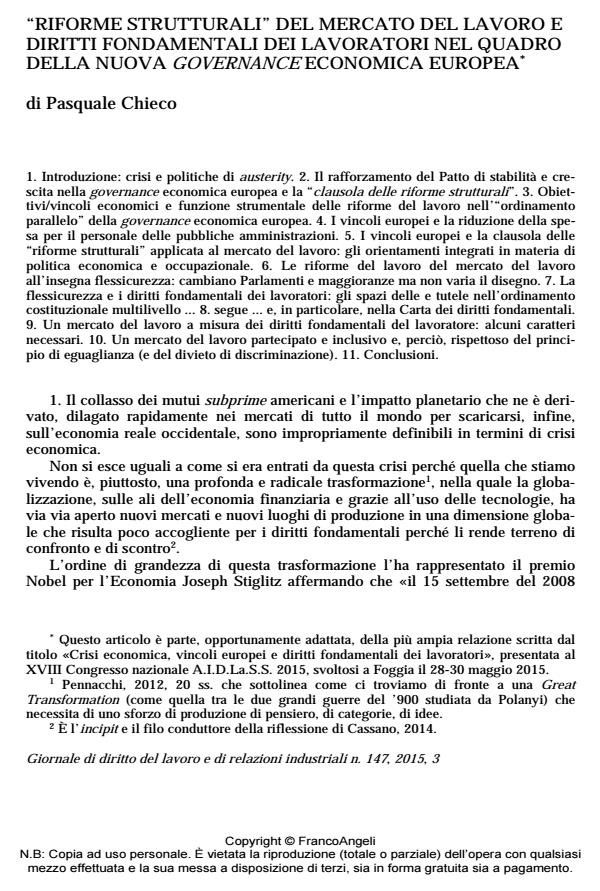"Riforme strutturali" del mercato del lavoro e diritti fondamentali dei lavoratori nel quadro della nuova governance economica europea*
Titolo Rivista GIORNALE DI DIRITTO DEL LAVORO E DI RELAZIONI INDUSTRIALI
Autori/Curatori Pasquale Chieco
Anno di pubblicazione 2015 Fascicolo 2015/147
Lingua Italiano Numero pagine 52 P. 359-410 Dimensione file 274 KB
DOI 10.3280/GDL2015-147003
Il DOI è il codice a barre della proprietà intellettuale: per saperne di più
clicca qui
Qui sotto puoi vedere in anteprima la prima pagina di questo articolo.
Se questo articolo ti interessa, lo puoi acquistare (e scaricare in formato pdf) seguendo le facili indicazioni per acquistare il download credit. Acquista Download Credits per scaricare questo Articolo in formato PDF

FrancoAngeli è membro della Publishers International Linking Association, Inc (PILA)associazione indipendente e non profit per facilitare (attraverso i servizi tecnologici implementati da CrossRef.org) l’accesso degli studiosi ai contenuti digitali nelle pubblicazioni professionali e scientifiche
Il saggio analizza gli obiettivi e i contenuti delle riforme strutturali del mercato del lavoro posti dalla nuova governance economica europea in funzione del sostegno (diretto e indiretto) al perseguimento degli obiettivi di bilancio e degli equilibri macroeconomici. Gli effetti regolativi di questo "ordinamento parallelo", rispetto a quello ordinario dei Trattati UE per la realizzazione delle politiche sociali e del lavoro, hanno investito in pieno le riforme italiane del 2012 (Governo Monti) e del 2014-2015 (Governo Renzi), spostando il focus della tutela dei diritti dei lavoratori dal contratto al mercato. In proposito, pur apprezzando le "risposte" a questo cambio di paradigma messe in campo dalle Corti costituzionali portoghese e italiana (sent. n. 70/2015), il saggio afferma la necessità di assumere come parametro normativo della tutela dei diritti dei lavoratori la Carta dei diritti fondamentali dell’Unione europea e come giudice di riferimento prioritario quello europeo. La tesi è quella della piena e diretta applicabilità della Carta a tutela dei diritti fondamentali dei lavoratori investiti dalle riforme nazionali del mercato del lavoro e si fonda sul fatto che esse sono «attuazione del diritto dell’Unione», facendo scattare il requisito di applicabilità dell’art. 51.1 della Carta. La sostenibilità sociale delle riforme espresse dalla governance economica europea all’insegna dell’austerity non può essere unicamente affidata alla tutela delle norme e dei giudici nazionali ma deve poter contare sugli anticorpi espressi dallo stesso diritto europeo, proprio con l’ampio ventaglio dei diritti sociali fondamentali proclamati nella Carta.
Parole chiave:Mercato del lavoro; Austerity; Governance economica europea; Diritti fondamentali; Carta dei diritti fondamentali dell’Unione europea.
- Highs and Lows of European Integration Matteo Borzaga, pp.231 (ISBN:978-3-319-93625-3)
- Effettività dei diritti fondamentali del lavoratore: attuazione, applicazione, tutela Patrizia Tullini, in GIORNALE DI DIRITTO DEL LAVORO E DI RELAZIONI INDUSTRIALI 150/2016 pp.291
DOI: 10.3280/GDL2016-150004 - Creativity and School Education: Subjects Vs Professional Identity in a Sample of Teachers in Italy Orazio Licciardello, Maria Elvira De Caroli, Claudia Castiglione, Elisabetta Sagone, in Key Engineering Materials /2010 pp.515
DOI: 10.4028/www.scientific.net/KEM.437.515 - The Rule of Law in the EU Matteo Borzaga, pp.263 (ISBN:978-3-031-55321-9)
Pasquale Chieco, "Riforme strutturali" del mercato del lavoro e diritti fondamentali dei lavoratori nel quadro della nuova governance economica europea* in "GIORNALE DI DIRITTO DEL LAVORO E DI RELAZIONI INDUSTRIALI " 147/2015, pp 359-410, DOI: 10.3280/GDL2015-147003